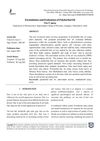 27 citations,
October 1945 in “Endocrinology”
27 citations,
October 1945 in “Endocrinology” Synthetic hormone treatment reduces melanin and hair growth in rats.
[object Object] 12 citations,
May 2013 in “International Journal of Dermatology” Ethosomes improve black tea extract absorption in hair dye.
 1 citations,
August 2021 in “International journal of scientific research in science and technology”
1 citations,
August 2021 in “International journal of scientific research in science and technology” The polyherbal hair oil promotes hair growth, reduces hair loss, and is safe to use.
63 citations,
February 2017 in “ACS biomaterials science & engineering” Polydopamine is a safe, effective, and permanent hair dye that turns gray hair black in one hour.
 28 citations,
January 2007 in “Journal of dermatology”
28 citations,
January 2007 in “Journal of dermatology” Three white adults had a rare scalp condition with increased fat and sometimes hair loss, suggesting it's not limited to black women and might be more widespread.
 8 citations,
June 2021 in “Frontiers in Bioengineering and Biotechnology”
8 citations,
June 2021 in “Frontiers in Bioengineering and Biotechnology” Extracts from Alnus sibirica and oregonin may help with hair growth and prevent hair loss.
 7 citations,
February 2019 in “International Journal of Dermatology”
7 citations,
February 2019 in “International Journal of Dermatology” Gray hair is caused by reduced melanin production or transfer issues, linked to aging and possibly health conditions, with treatments focusing on color camouflage.
4 citations,
January 2019 in “Micron” Fetal hair follicles have melanocytes with melanosomes at different stages, which are broken down into pigment particles in keratinocytes.
 3 citations,
May 2018 in “Journal of nutritional health & food science”
3 citations,
May 2018 in “Journal of nutritional health & food science” Nutritional supplements can help manage hair loss and promote hair growth by strengthening hair roots and countering harmful effects of pollution, smoking, and deficiencies in vitamins and minerals.
 2 citations,
January 2014 in “Springer eBooks”
2 citations,
January 2014 in “Springer eBooks” The book details skin conditions in older adults, their link to mental health, cancer treatment importance, hair loss remedies, and managing autoimmune and itchy skin.
 1 citations,
January 2023 in “International Research Journal of Ayurveda & Yoga”
1 citations,
January 2023 in “International Research Journal of Ayurveda & Yoga” Ayurveda suggests natural treatments for premature hair greying caused by an imbalance of Pitta dosha.
[object Object]  1 citations,
April 2018 in “International journal of Ayurvedic medicine”
1 citations,
April 2018 in “International journal of Ayurvedic medicine” Certain Ayurvedic herbs may help manage premature greying of hair.
40 citations,
September 2019 in “World journal of clinical cases” An elderly man's hair grew back after a treatment that transferred healthy gut bacteria.
 5 citations,
January 2018 in “Acta dermato-venereologica”
5 citations,
January 2018 in “Acta dermato-venereologica” Premature hair greying may indicate a higher risk of metabolic problems.
 October 2024 in “International Journal of Molecular Sciences”
October 2024 in “International Journal of Molecular Sciences” Rosa rugosa extract promotes hair growth and could be a natural treatment for hair loss.
 April 2024 in “Skin appendage disorders”
April 2024 in “Skin appendage disorders” Environmental pollutants can damage hair health and cause hair loss.
December 2023 in “Frontiers in Medicine” Hair samples can reliably monitor tacrolimus levels in kidney transplant patients.
 6 citations,
January 2010 in “Springer eBooks”
6 citations,
January 2010 in “Springer eBooks” SA linked to mitochondrial issues and oxidative stress, while AGA involves disrupted hair growth genes.
 2 citations,
January 2023 in “Pharmaceuticals”
2 citations,
January 2023 in “Pharmaceuticals” Natural products and phytochemicals may help with hair regrowth, but more research is needed.
 October 2022 in “Southeast Asian journal of health professionals”
October 2022 in “Southeast Asian journal of health professionals” Hair greying is seen as a sign of aging; temporary fixes like hair dye are used, but a balanced diet and hair care can help manage it.
 12 citations,
May 2015 in “Molecular Medicine Reports”
12 citations,
May 2015 in “Molecular Medicine Reports” Troxerutin helps protect skin cells from oxidative stress and may be good for treating hair loss.
March 2022 in “International Journal of Trichology” Smoking may worsen hair loss, but more research is needed.
 1 citations,
November 2015 in “Lʹvìvsʹkij klìnìčnij vìsnik”
1 citations,
November 2015 in “Lʹvìvsʹkij klìnìčnij vìsnik” Correcting trace element imbalances may help reduce alopecia areata symptoms.
 July 2024 in “Annals of Phytomedicine An International Journal”
July 2024 in “Annals of Phytomedicine An International Journal” Herbal ingredients like aloe vera and hibiscus can help with hair problems like hair loss and dandruff.
 December 2022 in “Cosmetics”
December 2022 in “Cosmetics” The food supplement improved hair growth and strength in people with a certain type of hair loss and had no major side effects.
 October 2020 in “Ayurline: international journal of research in indian medicine”
October 2020 in “Ayurline: international journal of research in indian medicine” Poor quality hair products contribute to premature greying in children.
 49 citations,
October 2014 in “International Scholarly Research Notices”
49 citations,
October 2014 in “International Scholarly Research Notices” Eclipta alba has many health benefits and contains compounds with potential for drug development.
 46 citations,
August 2019 in “Journal of Ethnopharmacology”
46 citations,
August 2019 in “Journal of Ethnopharmacology” Eclipta prostrata has many traditional uses and health benefits, but more research is needed to understand how it works and ensure it's safe.
 11 citations,
January 2016 in “Journal of clinical & experimental dermatology research”
11 citations,
January 2016 in “Journal of clinical & experimental dermatology research” Substance abuse can cause various skin problems, including marks from injections, sores, premature aging, and increased cancer risk.
 2 citations,
September 2014 in “Journal of evolution of medical and dental sciences”
2 citations,
September 2014 in “Journal of evolution of medical and dental sciences” Most HIV patients in the study showed skin and mucous membrane issues, with oral thrush being the most common.
























